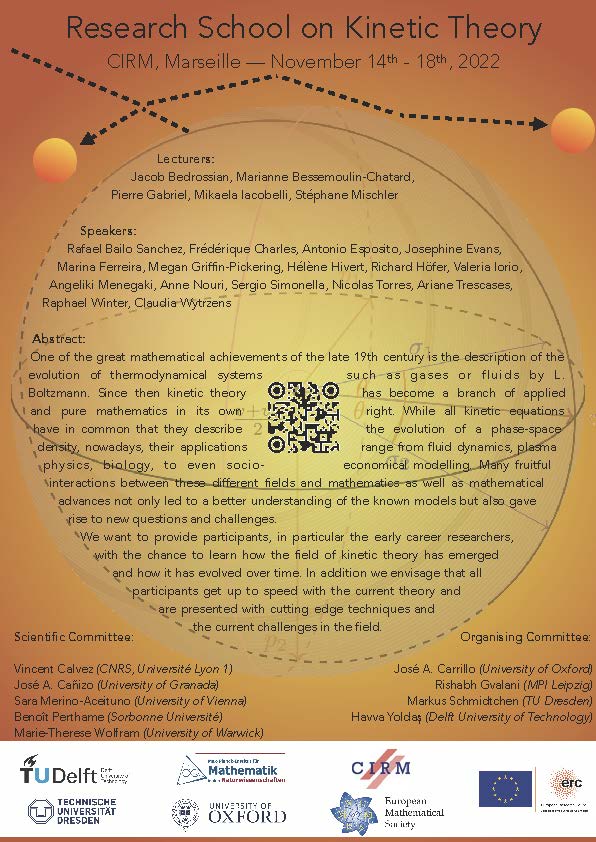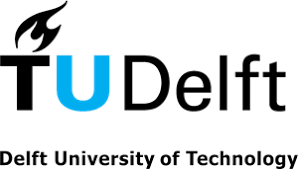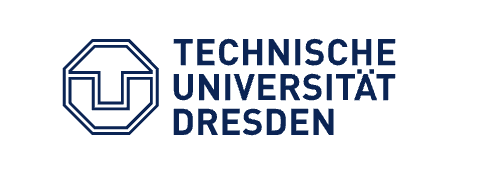RESEARCH SCHOOL / ECOLE DE RECHERCHE
Kinetic Theory
Théorie Cinétique
14 – 18 November 2022
Scientific Committee
Comité scientifique
Vincent Calvez (CNRS, Université Lyon I)
José A. Cañizo (University of Granada)
Sara Merino-Aceituno (University of Vienna)
Benoît Perthame (Sorbonne Université)
Marie-Thérèse Wolfram (University of Warwick)
José A. Cañizo (University of Granada)
Sara Merino-Aceituno (University of Vienna)
Benoît Perthame (Sorbonne Université)
Marie-Thérèse Wolfram (University of Warwick)
Organizing Committee
Comité d’organisation
José Antonio Carrillo (University of Oxford)
Rishabh Gvalani (Max Planck Institute, Leipzig)
Markus Schmidtchen (Technical University Dresden)
Havva Yoldaş (Delft University of Technology)
Rishabh Gvalani (Max Planck Institute, Leipzig)
Markus Schmidtchen (Technical University Dresden)
Havva Yoldaş (Delft University of Technology)
One of the great mathematical achievements of the late 19th century is the description of the evolution of thermodynamical systems such as gases or fluids by L. Boltzmann. Since then kinetic theory has become a branch of applied and pure mathematics in its own right. While all kinetic equations have in common that they describe the evolution of a phase-space density, nowadays, their applications range from fluid dynamics, plasma physics, biology, to even socio-economical modelling. Many fruitful interactions between these different fields and mathematics as well as mathematical advances not only led to a better understanding of the known models but also gave rise to new questions and challenges.
The purpose of this CIRM Research School is manifold: we want to provide participants, in particular the early career researchers, with the chance to learn how the field of kinetic theory has emerged and how it hase volved over time. In addition we envisage that all participants get up to speed with the current theory and are presented with cutting edge techniques and the current challenges in the field.
The purpose of this CIRM Research School is manifold: we want to provide participants, in particular the early career researchers, with the chance to learn how the field of kinetic theory has emerged and how it hase volved over time. In addition we envisage that all participants get up to speed with the current theory and are presented with cutting edge techniques and the current challenges in the field.
L’un des grands triomphes mathématiques de la fin du XIXe siècle est la description de l’évolution des systèmes thermodynamiques tels que les gaz ou les fluides par L. Boltzmann. Depuis lors, la théorie cinétique est devenue une branche des mathématiques appliquées et pures à part entière. Si toutes les équations cinétiques ont en commun de décrire l’évolution de la densité dans le phase space, de nos jours, leurs applications comprennent la dynamique des fluides, la physique des plasmas, la biologie et la modélisation socio-économique. De nombreuses interactions fructueuses entre ces différents domaines et les mathématiques, ainsi que les progrès des mathématiques, ont permis de mieux comprendre les modèles connus, mais elles ont également soulevé des nouvelles questions et de nouveaux challenges.
Les objectifs de cette Research School du CIRM sont : nous voulons offrir aux participants, en particulier aux jeunes chercheurs, la possibilité d’apprendre comment le domaine de la théorie cinétique est apparu et comment il a évolué au fil du temps. En outre, nous envisageons que tous les participants se familiarisent avec la théorie actuelle et se voient présenter les techniques de pointe et les défis actuels dans ce domaine.
Les objectifs de cette Research School du CIRM sont : nous voulons offrir aux participants, en particulier aux jeunes chercheurs, la possibilité d’apprendre comment le domaine de la théorie cinétique est apparu et comment il a évolué au fil du temps. En outre, nous envisageons que tous les participants se familiarisent avec la théorie actuelle et se voient présenter les techniques de pointe et les défis actuels dans ce domaine.
LECTURES
Jacob Bedrosian (University of Maryland) An introduction to Landau damping
Marienne Bessemoulin-Chatard (Nantes Université) Construction and Analysis of Finite Volume Schemes for Kinetic Equations
Pierre Gabriel (Université de Versailles Saint-Quentin-en-Yvelines) Asymptotic behaviour of kinetic models in structured population dynamics via Harris’s appraoch
Mikaela Iacobelli (École polytechnique fédérale de Zürich) An Introduction to the Vlasov-Poisson System
Stéphane Mischler (Dauphine Université Paris) On Kac’s Programme in Kinetic Theory
SPEAKERS
Rafael Bailo (University of Oxford) tba
Frédérique Charles (Sorbonne Université) An introduction to particle methods for kinetic equations
Antonio Esposito (University of Oxford) On a kinetic interpretation of the aggregation equation
Josephine Evans (University of Warwick) Existence of steady states for an Elo chess ranking model
Marina Ferreira (University of Helsinki) Coagulation equations for open systems
Megan Griffin-Pickering (Durham University) Recent results on the quasi-neutral limit for the ionic Vlasov-Poisson system
Hélène Hivert (École Centrale Lyon) On a structure-preserving numerical method for the Lévy-Fokker-Planck equation
Richard Höfer (Université de Paris) Mean-field limits for particle suspensions in Stokes flows
Valeria Iorio (University of L’Aquila) Multi-species system with non-local interactions with small inertia
Angeliki Menegaki (Université Paris-Saclay) Spectral gap for longer-range interactions in harmonic chain of oscillators
Anne Nouri (Aix-Marseille Université) Discrete Boltzmann equations in the plane
Sergio Simonella (CNRS – ENS Lyon) Recent developments on the foundations of kinetic theory
Nicolas Torres (Université Claude Bernard Lyon 1) A multiple time renewal equation for neural assemblies with elapsed time model
Ariane Trescases (CNRS – Université Toulouse III – Paul Sabatier)
Raphael Winter (University of Vienna) Landau damping for a point charge in interaction with a screened Vlasov-Poisson plasma
Claudia Wytrzens (University of Vienna) Coarse-graining of particle interactions via anisotropic repulsion potentials
Frédérique Charles (Sorbonne Université) An introduction to particle methods for kinetic equations
Antonio Esposito (University of Oxford) On a kinetic interpretation of the aggregation equation
Josephine Evans (University of Warwick) Existence of steady states for an Elo chess ranking model
Marina Ferreira (University of Helsinki) Coagulation equations for open systems
Megan Griffin-Pickering (Durham University) Recent results on the quasi-neutral limit for the ionic Vlasov-Poisson system
Hélène Hivert (École Centrale Lyon) On a structure-preserving numerical method for the Lévy-Fokker-Planck equation
Richard Höfer (Université de Paris) Mean-field limits for particle suspensions in Stokes flows
Valeria Iorio (University of L’Aquila) Multi-species system with non-local interactions with small inertia
Angeliki Menegaki (Université Paris-Saclay) Spectral gap for longer-range interactions in harmonic chain of oscillators
Anne Nouri (Aix-Marseille Université) Discrete Boltzmann equations in the plane
Sergio Simonella (CNRS – ENS Lyon) Recent developments on the foundations of kinetic theory
Nicolas Torres (Université Claude Bernard Lyon 1) A multiple time renewal equation for neural assemblies with elapsed time model
Ariane Trescases (CNRS – Université Toulouse III – Paul Sabatier)
Raphael Winter (University of Vienna) Landau damping for a point charge in interaction with a screened Vlasov-Poisson plasma
Claudia Wytrzens (University of Vienna) Coarse-graining of particle interactions via anisotropic repulsion potentials









